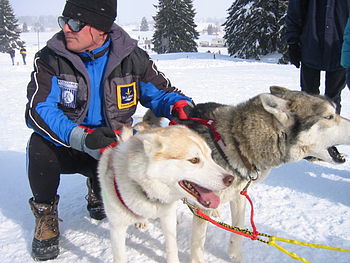 |
| Husky (Photo credit: Wikipedia) |
Keep in mind that animal instinct should not be confused with disobedience. Negative behaviors by your Husky are what you will probably want to address first. The best method that you can use when adjusting bad behavior is to focus on molding how their natural instincts come out in behavior. Losing your cool and yelling at your Husky will do nothing to change their behavior. Remember your Husky is looking for a strong leader, not a bully.
Core Husky Training
There are a number of basic Husky training methods that a Husky owner should consider when beginning to train their cute, but an often mischievous fluffy friend. These methods can make your life a lot less stressful as far as training your Husky goes.
Crate Training - Crate training provides your Husky with a territorial space or home that it can call it's own. Crates should not be used as a form of punishment. Initially when you are crate training your husky to make sure you never leave your Husky on his own. The more time you spend with your Husky when crate training the better the transition. Crate training can provide a good foundation for housing training, reducing barking and preventing anxiety type issues.
Leash Training - If you are coming up against a few hurdles when walking your dog on a leash, you should take a step back and make sure that your Husky is behaving calmly before heading off for a walk. This may require some waiting when you are first using this technique. Once your Husky is calm, the likelihood of a good response to your command on your upcoming walk is greatly increased. The majority of dogs with leash issues simply are not aware that it is not acceptable behavior. If your dog pulls on the leash, pause and makes them sit by your side calmly before walking off again. Eventually, your Husky will associate them pulling with the walk being stopped. This technique works in the majority of cases.
The Alpha Position - As you may well be aware, Huskies are working pack dogs famed for their endurance while working in a team. Definitely the most important training tips I can offer relate to putting yourself in 'The Alpha Position' in your home. It is up to you to teach your Husky that you are the leader of the pack and have control in your home. Once they know you are the leader and will offer them protection, your Husky will feel a lot calmer making learning and training a lot easier. Training your Husky will take time and the earlier you get this started, the less frustration you will face down the track.
Obedience Training - I personally recommended taking your Husky to obedience training classes or at the very least puppy school. You will be able to teach your Husky basis commands without too much problem but Huskies really need social interaction. A training session led by an experienced dog trainer will also teach you as an owner how to be firm but fair and to stay in the alpha position. If you have an older dog that has become stubborn overtime or who has not got rid of annoying behavior, formal obedience training is a very good option.
Husky Training in a Consistent Way
A common thread in all dog training tips is the need to stay consistent in the way you are treating and training your dog. For example, if you do not want your Husky on your bed, but you sometimes allow your Husky on the bed first thing in the morning, that is very confusing for your dog. Dogs are smart to a degree, but they always respond best to a consistent environment where lessons are repeated in a firm but fairway. Develop rituals like always sitting before crossing a road and maintain these habits. This creates a willingness to comply with your Husky. Make sure that everybody in your home knows the ground rules for your Husky to avoid mixed messages. The best way to achieve consistent husky training is to seek out the best husky training information.
At HuskyTips.com you will find quality Husky Information. The best place to find Husky Training Information and other Husky advice on health, obedience, temperament, and many other important topics.
|

No comments:
Post a Comment